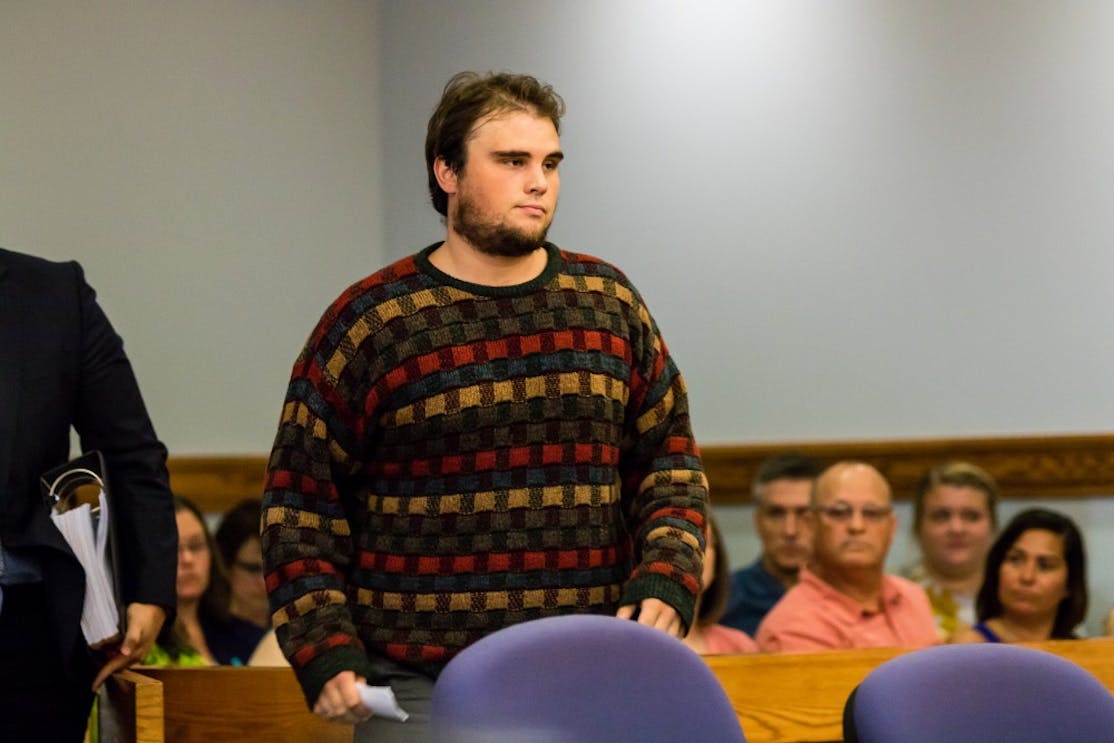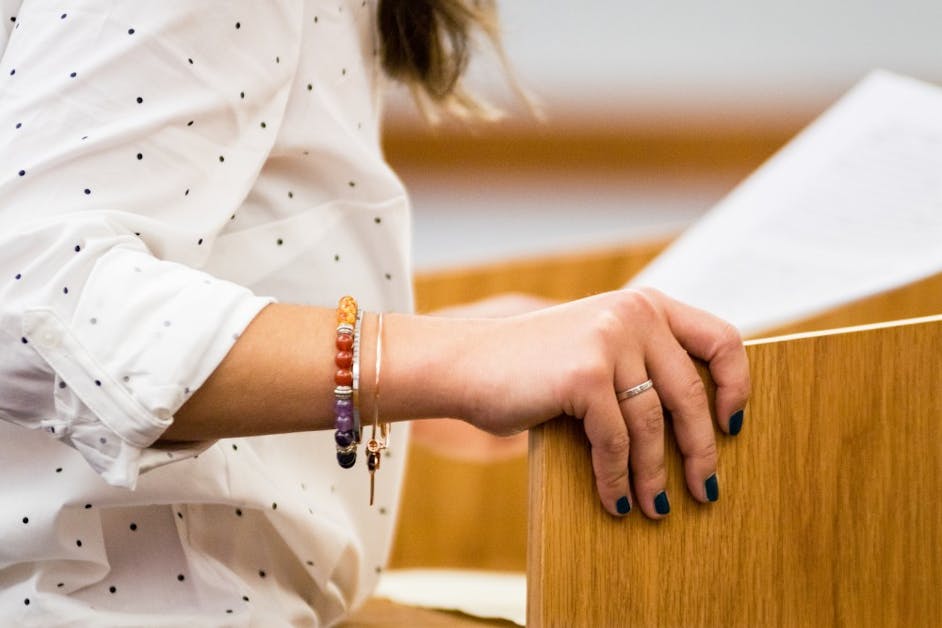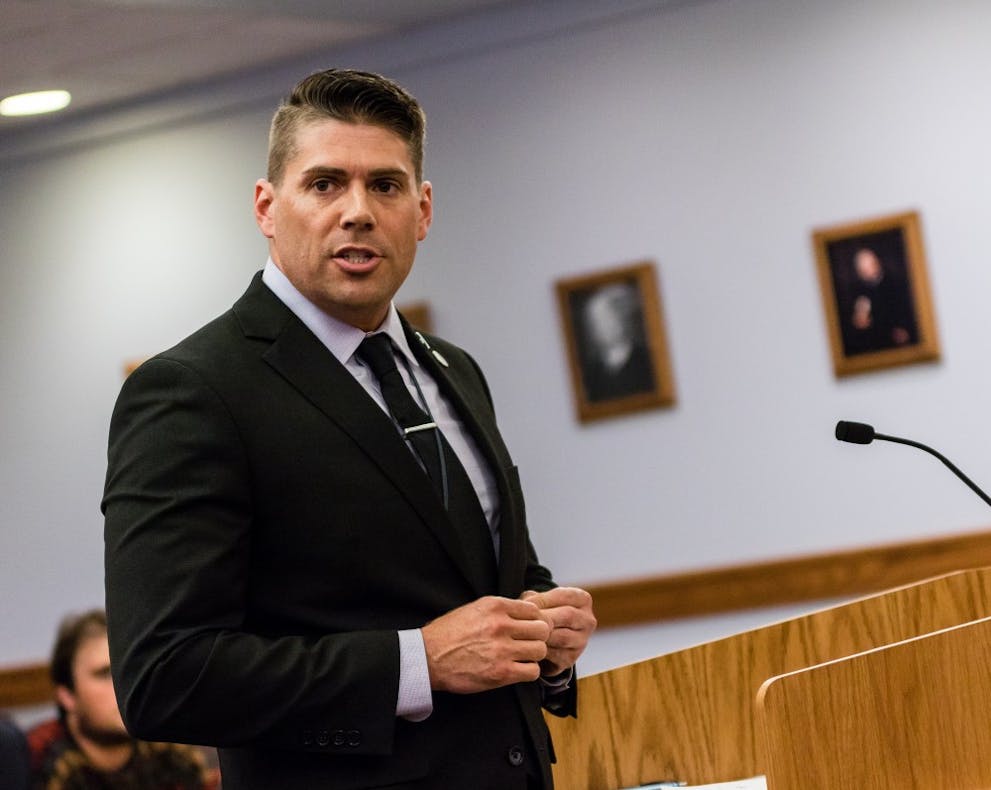"Ian picked the strongest, most resilient women to mess with" Sexual assault survivors deliver statements at Elliott sentencing

As the time drew closer to 1:15 p.m. on Friday, Aug. 2, people dressed in blue and teal gathered outside a courtroom at the Isabella County Trial Court. People who walked up the stairs in the courthouse were greeted with enthusiasm and appreciation.
All of them were handed a small teal ribbon to pin on their shirts. What appeared to be a gathering of family and friends was much more than that - it was also a reckoning.
Family and friends of Rachel Wilson and Landrea Blackmore quietly filled the courtroom. The Central Michigan University alumnae said they were overwhelmed by the amount of support they received.
"There were many individuals in the courtroom," Blackmore said. "But there were hundreds of individuals who reached out personally and said 'we're not here today, but we're supporting you.'"

A hush fell over the crowd as the former CMU Student Government Association president walked in with his defense attorneys and took his seat. Elliott wore a color-block sweater and sported a fully-grown beard – a deviation from the suit and tie and clean-shaven face from previous hearings.
Then, silence.
Elliott's sentencing finally began shortly after 2 p.m. The court proceeding marked the end of a long legal battle for Wilson.
By the end of the afternoon, her rapist was sent to prison.
Elliott's defense accepted a plea agreement on June 24 in two cases of sexual assault. He pleaded no contest to one count of third-degree criminal sexual conduct. In Michigan, a no contest plea is not an admission of guilt, but when a no contest plea is accepted, the defendant can be sentenced as though they had plead guilty or been found guilty of the charge. After the settlement conference, Elliott's sentencing was scheduled.
During the sentencing hearing, Judge Eric Janes accepted the plea agreement. He sentenced Elliott to a minimum of 366 days to 15 years in state prison. Elliott also must register as a sex offender in the state of Michigan for the rest of his life.
In Wilson's case, he was charged with two counts of third-degree criminal sexual conduct and one count of assault with intent to penetrate. In Blackmore's case, Elliott was charged with one count of third-degree criminal sexual conduct. As part of the agreement, two counts in Wilson's case and the charge in Blackmore's case were dropped.
Although Blackmore's case was consolidated with Wilson's, both delivered victim impact statements at the sentencing. They both faced off against the man who raped them.
Many of their supporters cried during the statements. Wilson and her family and friends cried when Blackmore spoke about the friendship they formed through this legal battle.
"I have found such a great friend in you and am so excited to join forces to advocate together against sexual assault," Blackmore said to Wilson. "Regardless of why we’re here or how we’ve come together, that is truly the silver lining of all of this. One of the biggest things I’ve learned though this all is the beauty that can come from such disaster.
"Ian picked the strongest, most resilient women to mess with," Blackmore said.
The women said waging this legal battle was not easy. When Wilson was preparing for her first preliminary hearing in January 2018, she questioned whether it was worth going to trial.
"I felt that if he were to be convicted one day, I would feel as if I ruined his life," she said. "The day I came to my senses was the day it clicked with me that although I didn't hate him, I could not hate myself either. I could never ruin his life because he did that all on his own."
Wilson thinks she was drugged the night of her assault. After having two beers, she became much more energetic and chatty than usual. When she got in a taxi with Elliott, she said her legs felt like wet noodles. She began vomiting when they got to his house and later passed out. She said Elliott sexually assaulted her after she regained consciousness.

"The bucket filled with puke sitting next to the bed didn't divert him from getting what he wanted," Wilson said, bracing herself against the podium in the courtroom. "With no hesitation, he climbed on the bed and began kissing my mouth. Again, the smell of vomit gave him no reason for pause. Neither did my motionless response."
After Wilson's first preliminary hearing, her case was set to go to trial that spring. One month before the trial, Interim Isabella County Prosecutor Robert Holmes dismissed the case due to what he called insufficient evidence.
On Dec. 20, 2018, the Attorney General's office filed new charges against Elliott. Wilson, Blackmore and two other women served as witnesses at a preliminary hearing on Feb. 12, 2019. Blackmore filed her own charges against Elliott in March 2018 after the Attorney General's office found "sufficient evidence."
Blackmore said Elliott sexually assaulted her at a party on Nov. 15, 2014. She and Elliott met at a leadership camp in high school. She admired him and considered him a mentor. The night she said she was assaulted, she attended a "black light party" at the Phi Kappa Tau house, a fraternity Elliott was a part of. They went upstairs to talk during the party, which is when she said Elliott forced her to perform oral sex.
"The confusion, pain, and horror of Nov. 15, 2014 left me feeling broken and lost," she said through tears, "I had difficulty with daily functions in the days following. When I did sleep I often had horrible nightmares, and sometimes still do."
Assistant Attorney General Brian Kolodziej expressed his dissatisfaction with how Blackmore and Wilson were treated during the preliminary hearings.
In their statements, Wilson and Blackmore said they were questioned about their consumption of alcohol, their mental health and their familial relationships.
"After years of enduring the court process, I adamantly believe a major contributor to the impact a victim faces in the time after the assault is the court process itself," Wilson said. "The real travesty is that once you are raped and charges are filed, you are then figuratively raped again and again each time the defense digs into the personal and sensitive details of your past, only to use these details to twist this way and contort that way for their benefit."
Kolodziej read some of the questions Elliott's defense asked from transcripts for the court to hear. Many present in the courtroom began to cry as he read aloud.
"What are you claiming that this man did physically to cause you to agree to have sex with him," Kolodziej read from a court transcript from Wilson's examination. "'Well, first of all, I didn't agree to have sex with him.' So you were resisting and fighting? Just yes or no."

Kolodziej said that by asking questions like this, it causes the victims to relive their trauma all over again.
"The path that Ms. Wilson and Ms. Blackmore endured to get here is an illustration of why the numbers (of victims who come forward) are so low," he said. "This is why most victims don't come forward, and why the ones that do are so often silenced."
According to RAINN (Rape, Abuse and Incest National Network), out of every 1,000 rapes, 230 will be reported, 46 will lead to arrests, 9 will be referred to prosecutors and 5 will lead to felony convictions.
"I am saddened that my story is the unusual story," Wilson said. "Whereas the story of a rapist who beats the system is the story we all know by heart."



